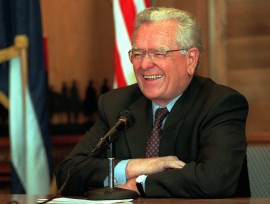Yet Hickenlooper’s broad discussion of several issues facing the state – a speech that often did not bring up his own agenda – might have been purposeful. Unlike previous years, Hickenlooper refrained from calling out specific legislators or issues, a sign that he might be encouraging the split legislative body to work together, said Sen. Bill Cadman, R-Colorado Springs, the newly appointed Senate president.
“I think what was interesting about this speech, as opposed to many others that I have heard, (was that) he talked in such broad categories that I think what he was really doing was inviting everybody to the table to discuss them,” Cadman said.
Hickenlooper was careful to call attention to elected leaders from the Republican Party in the House chamber, among them Colorado Springs Mayor Steve Bach, who the governor credited as being one of the driving forces behind a program that brings independent contractors to Colorado communities.
“This further demonstrates that no one party has all the good ideas,” Hickenlooper said of Bach, a Republican, who was in the audience.



 By Dominic Dezzutti
By Dominic Dezzutti



